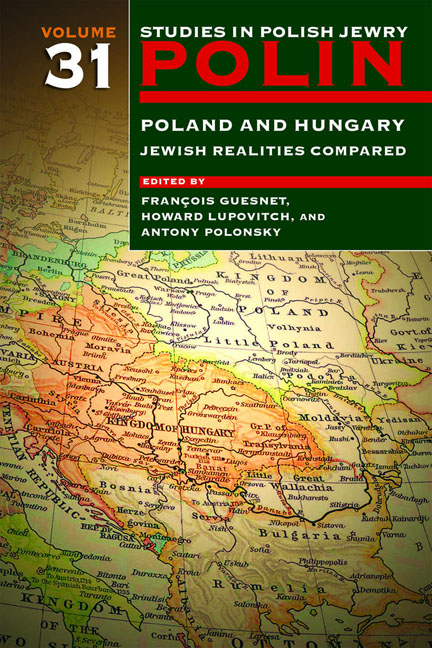Book contents
- Frontmatter
- Dedication
- Editors and Advisers
- Preface
- Polin
- Polin: Studies in Polish Jewry
- Contents
- Note on Place Names
- Note on Transliteration
- Part I POLAND AND HUNGARY: JEWISH REALITIES COMPARED
- JEWISH ACCULTURATION AND INTEGRATION
- JEWISH RELIGIOUS LIFE
- JEWS IN POPULAR CULTURE
- THE INTERWAR YEARS
- THE HOLOCAUST AND ITS AFTERMATH
- PERSONAL REFLECTIONS
- Part II NEW VIEWS
- Part III OBITUARIES
- Notes on the Contributors
- Index
The Ashkenaz of the South: Hungarian Jewry in the Long Nineteenth Century
- Frontmatter
- Dedication
- Editors and Advisers
- Preface
- Polin
- Polin: Studies in Polish Jewry
- Contents
- Note on Place Names
- Note on Transliteration
- Part I POLAND AND HUNGARY: JEWISH REALITIES COMPARED
- JEWISH ACCULTURATION AND INTEGRATION
- JEWISH RELIGIOUS LIFE
- JEWS IN POPULAR CULTURE
- THE INTERWAR YEARS
- THE HOLOCAUST AND ITS AFTERMATH
- PERSONAL REFLECTIONS
- Part II NEW VIEWS
- Part III OBITUARIES
- Notes on the Contributors
- Index
Summary
A COMPARISON of the modernization of the Jewish populations within the Polish and Hungarian societies of the long nineteenth century is a valuable exercise, since before 1919 these two groups formed the two largest Ashkenazi communities in Europe. Given the space limitations of this chapter, this can be done only with a broad brush, focusing both on differences (mostly) and similarities (some) from a sociohistorical perspective. I shall start by describing the context of this transformation.
POLITICAL AND GEOPOLITICAL ENVIRONMENT
The geopolitical settings of the two groups within multi-ethnic empires offer obvious parallels, although there were even more marked contrasts, including the special status and semi-autonomous administration of the Hungarian kingdom within the Habsburg empire. After 1867 the Habsburgs began to adopt a federalist and politically liberal policy towards the large Jewish populations in most of its provinces, including those from the former Polish Kingdom of Galicia.
The partitions of Poland between 1772 and 1795 divided Polish Jewry into four groups unequal in size and level of development with different historical destinies. As noted, the Habsburg empire acquired a large number of Jews in Galicia, who received equal rights with non-Jews in 1868. A number of Jews from the former Polish–Lithuanian Commonwealth found themselves under Prussian rule and achieved full emancipation in 1869. The tsarist empire, home to the majority of Jews from partitioned Poland, maintained, with ups and downs, its autocratic regime, aggravated following 1863 by heavily repressive measures of Russification and—particularly after 1881—increasingly antisemitic policies. In spite of limited steps towards granting them equal rights, notably in the aftermath of the liberation of the unfree peasantry in 1861, there was no full emancipation of Jews in the Russian empire until the 1917 February revolution. They remained, for the most part, restricted to the Pale of Settlement, harassed by pogroms, and limited in many ways in their professional and educational mobility (notably as a result of the academic numerus clausus of 1887). The situation of the Jews in the Kingdom of Poland, created at the Congress of Vienna in an unsuccessful attempt to reconcile Polish national aspirations with tsarist raisons d’état, was different and they were granted formal emancipation in June 1862.
- Type
- Chapter
- Information
- Polin: Studies in Polish Jewry Volume 31Poland and Hungary: Jewish Realities Compared, pp. 83 - 120Publisher: Liverpool University PressPrint publication year: 2018



